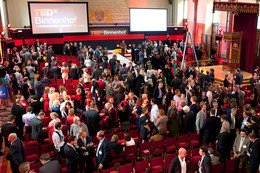The Smartpolder simultaneously pumps water, generates energy and helps avoid environmental problems, such as cyanobacteria. These functions taken together put the smart to the Smartpolder, which in combination with the city will produce many advantages and will create a cleaner environment.
Jeoffrey is a modern high-tech entrepreneur with a vision, which he can communicate like no other. Together with Technical University Eindhoven, he has been developing a technology that is very special. Their vision? The days of big manufacturing plants are over and the future lies in a lot of small factories. Materials need to be produced where the materials are available and needed (close to the end-users). The same goes for ingredients and additives. At the moment, these materials, ingredients and additives are produced in extremely big plants of – for example – Shell and DSM. In the near future, this can be done on a much smaller scale. Safe, sustainable and flexible.
Coen van de Steeg has initiated the platform WeHelpen, which has lead to a nationwide movement to stimulate and increase mutual support systems in the community at the local level.
Prof. dr. ir. Bert Weckhuysen is professor Inorganic Chemistry and Catalysis at Utrecht University. His research focuses mainly on analysing and dissecting chemical and catalyst processes for optimization. The resulting knowledge plays an important role in these future developments. By showing the latest technological advancements Weckhuysen will present an outlook on the city of the future, which might even have a shortage of CO2…
Onno van Schayck, as professor of Preventive Medicine, is involved in the project “A chimney for every child”. The goal of the project is to supply millions of houses in the slums of India with self-made chimneys (or make-shift chimneys). In the slums people cook inside their homes (without any space in between the houses) with children lying there in the smoke all day, every day. The goal is to be able to produce the chimneys locally and to place them in the homes for less than 2 euros a piece. In order for this to work, there is a need for real innovation. Doctors are working alongside technicians to make this happen within a timeframe of 6 to 12 months.
Pectcof technology unlocks the potential of the coffee pulp as a source of biobased materials, at the same time detoxifying the waste stream produced by the second most traded commodity in the world. Pectcof’s cradle-to-cradle concept not only adds value to the waste stream of coffee, but will assure sustainability in the coffee supply chain. Pectcof’s first product is coffee pectin; this product has special characteristics that are desired by food processors and pharmaceutical industries. Because pectin is a defined as a natural ingredient, has unlimited potential of availability and contains unique functionalities, coffee pectin has the potential to conquer an important part of food additives on the world market. Other compounds like polyphenols are being studied for purification and market introduction.
It sounds uncanny, generating warm water from the sewer system. But it is sustainable. The average temperature of sewer-water is 18 degrees. At the moment, this energy flows, without being used, through the drains to the sewage filtration system. With the Hydrea Thermpipe, an innovative ‘energy drill pipe’ designed by Heijmans, this warmth can be reused in a clean and safe way. This way, the energy-neutral system is one step closer.
Plants have always been a great source of nutrients for animal and man, but always at the cost of the plant itself. Jeroen Rondeel has developed a technique with which he can “milk” the nutrients from plants without causing too much damage to them. After 3 weeks the plants will have healed sufficiently to be milked again.
Plant-e is producing products with which electricity can be generated from living plants. The technology makes it possible to generate electricity from almost every area that grows plants. The products use completely natural processes and are therefore secure for the plants and their environment. Research has shown that the growth of the plant is not limited by the process, so the plant will continue to grow while generating electricity.
Mike Eman is the Prime Minister of Aruba. Four years ago, Mike Eman, prime minister of Aruba, expressed a very special ambition. In 2020, Aruba aims to be a fully sustainable, self-sufficient society. A 5-star society, as he likes to think of it. A sustainable society running on green energy, in which economic growth serves the wellbeing of the people.

